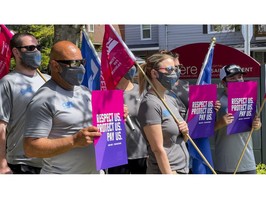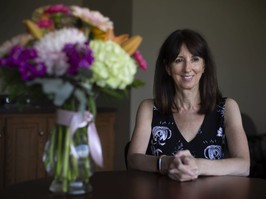powered by:
valneva canada inc.
opinion: rules for alternative med need enforcement
the current version of ontario policy was written in 1997, at a time when health misinformation had a much different role in society.
mar 24 2021
 5 minute read
5 minute read


a new draft for ontario alternative medicine guidelines doesn't feature enforcement standards.
getty
the college of physicians and surgeons of ontario’s (cpso) draft of a policy guiding doctors’ use of alternative medicines does not go far enough in protecting patients.
the cpso, the self-governing body that regulates the practices of medical doctors, is developing policies on what types of alternative medicines (cam) mds can prescribe and how they should discuss them with their patients. however, the policy does not include enforcement standards, raising the question of how effective it will be in the face of mounting pressure from alt-health groups.
the current version of the cpso’s cam policy was written in 1997, at a time when health misinformation had a much different (and less powerful) role in our society. since then, social media has taken on a new role. we are saturated with information, both accurate and inaccurate, making people more vulnerable to anti-vaccine rhetoric and conspiracy theories at a time when we desperately need public support for science.
physicians are not immune to health misinformation, nor to the financial temptations of offering phony “alternative” treatments for a fee. over the past two decades, alternative health companies have created more and more products and thus more opportunities for physicians to earn money by promoting them. this can lead to conflicts of interest in which doctors prescribe products that are not needed because it creates revenue for them. doctors can also profit from the referral fees for sending patients to alternative health clinics. these practices compromise public confidence in our health institutions.
advertisement
advertisement
within this context, it’s an important step for the cpso to draft a new, more rigorous cam policy. the college has now undertaken two years of public consultations, surveying health providers and the public, and it will release a new guide later this year.
i’ve seen a draft of the new policy. it’s stronger than the 1997 version (and its 2000/2011 updates). the revised policy now clearly emphasizes physicians’ responsibility to avoid conflicts of interest and scams. the overall wording of the document is more forceful as well. as the cpso notes in its survey, it has evolved from using “ informed by evidence” as a standard of care to “ supported by evidence and scientific reasoning.” it has also replaced the concept of “ advised ” conduct with the phrase “ physicians must , ” which appears in bold letters throughout the new document. for example:
- “physicians must not provide complementary or alternative treatments that have been proven ineffective.”
- “physicians (prescribing cam) must specifically document the risk-benefit analysis undertaken to determine its appropriateness.”
the new version makes it easier to gather evidence in complaints about a physician because it mandates better record-keeping by physicians prescribing cam. its conflicts of interest section is also stronger, outlining consequences for physicians who make money selling phony products or who profit from bogus referrals to alternative care clinics. it includes the directive that physicians “ must not associate themselves with any advertising for a commercial product or service other than their own medical services … and must ensure any published materials relating to a professional affiliation are accurate, factual, and based on evidence and scientific reasoning.”
advertisement
advertisement
in response to these changes, cam providers are pressuring the college to revise the draft to be more friendly to their business interests. their group, ontario patients for integrative medicine (opim), advises followers to write to the college and visit its public consultation portal, stating: “our access to integrative medicine is at risk. patients will suffer!”
when i contacted opim to ask if people from outside of ontario could contribute to this provincial consultation, i received a reply stating that a person from out of province “can most definitely write letters, complete the survey and submit a response on the college’s consultation page if you are not from ontario.” opim supporters have flooded the cpso’s online consultation portal with claims that patient rights could be taken away by the new guidelines. but the college is not stopping the manufacture or sale of cam products, nor is it preventing people from using them. the proposed new policy only directs physicians to avoid conflicts of interest, to keep proper records and to not mislead patients about unproven products.
the opim doesn’t acknowledge that some forms of cam exploit patients, nor that some products put patient safety at risk. instead, it has framed the issue as “cam under attack.” but in this era of health misinformation, it’s almost comical to conceive of cam being under attack because cam is everywhere– from the pharmacy aisles and convenience stores to palliative care clinics and our social media feeds. meanwhile, anti-mask rallies and the plandemic movement compromise our ability to manage covid-19 and bring the pandemic to an end. these projects paint a grim picture of the broader cam community as an enabler of dangerous health misinformation.
advertisement
advertisement
as an advocate against exploitative forms of cam, my concerns are different than opim’s. in my view, the cpso’s proposed new policy is not strong enough. i fear that the document could have little more than a symbolic meaning if the college doesn’t also take action to ensure that its policies are enforced. under the draft, the cpso is not mandated to meaningfully investigate complaints about physicians involved in pseudoscience. without enforcement, the new policy may be little more than words on paper.
in fact, that is how the old policy sometimes played out. in 2018, i wrote a complaint to the college about an md who was promoting anti-vaccine ideology while treating autistic children with an expensive, off-label drug (chelation) that has no evidence of benefit and clear evidence of harm, including deaths. the procedure violates both u.s. and u.k. law as well as the college’s own cam policy. yet the cpso claimed that it was not required to pursue the complaint and dismissed it without even reviewing the evidence i’d submitted. three years later i am still asking myself: why?
now, reading the college’s proposed policy, i see once again a glaring omission: enforcement. and i wonder why the college doesn’t include it. after all, a policy – no matter how strongly worded – is only as powerful as the cpso’s will to enforce it.
advertisement
advertisement
anne borden king is the founder of the campaign against phony autism cures, canada and the host of noncompliant, a podcast about neurodiversity.
this story was originally published on healthy debate. find the original story here.




